Generating Spell Lists
Generating Spell Lists
Unlike priests who are simply granted their spells by a higher power, wizards must take the time to learn their spells. Ancient wizards analyzed the ebb and flow of mana, how combinations of focus, gesturing, verbalization of words of power and other factors tapped and shaped the mana into desired effects. From this complex formulae were developed and masters began passing this knowledge along to students and schools were developed to structure the mastery of these equations. However, retaining these magic recipes is not always an easy task. For the purposes of game mechanics a wizard’s Intelligence stats are key in determining how much a wizard can retain and how well they can learn new spells. The Reason sub-stat represents a wizard’s ability to solve the intricate puzzles that magic presents in it’s affect on the laws of the universe and the ability to think “outside the box.” This translates into setting the upper limit of understanding and capacity for the number of spells that can be known at each spell level. The Knowledge sub-stat represents the wizard’s basic learning ability, study habits and rote memorization skill. This translates into a base percentage chance for learning a given spell formula. Further details on this are described below
Spell Spheres
There are three spheres or groupings of spell power within wizardly or arcane magic. The first is the Minor Sphere which encompasses all 1st - 3rd level spells. The second is the Median Sphere, encompassing 4th - 6th and finally Major Sphere for 7th - 9th. The spheres of power are separated by the relative strength of the magic as well as the difficulty of learning the spells within the sphere. This has a direct effect on gaining spells for wizards as they go up in level
Spell Learning and Acquisition
Under the tutelage of a master and/or appropriate schooling a wizard does not have to make a knowledge roll (DM) to learn new spells specific to his school’s signature spells or his specialty. Wizards will automatically gain the signature spells for their school as well as a minimum of three to five spells from the specific focus mana school or mana element from the general spell list. At the DM’s discretion he may also simply assign all spells from a particular spell level within the focus area without any Knowledge checks required. If a DM would like a more random element of spell learning involved then the following rules should be used:
The base spell learning percentage is a character’s Knowledge score x5% (thus a Know 16 = 80% Base chance to learn a spell.) Keep in mind that a 96% to 100% roll is ALWAYS a failure no matter how high the Knowledge score is. However, Knowledge scores in excess of 20 do offset penalties to spell learning (i.e. – a wizard with a Know 22 has a base learning chance of 110% so a -25% penalty gives such a wizard an 85% chance of learning a difficult spell.) Below are modifiers:
Minor Sphere spells no penalty
Median Sphere spells -10%
Major Sphere spells -25%
Within specialist school/element +25%
Near oppositional school/element -15%
Learning from Wizard w/lower Reason -20%
Learning from ancient scroll/book -25%
Learning from other unfamiliar source -30%
Number of Spells
The Reason score provides the base for a maximum number of spells that a wizard can know of a particular spell level. Due to the relative ease in nature of Minor Sphere magic wizards may gain up to their Reason score minus two spells for all minor sphere levels (i.e. – a mage with an 18 reason has a maximum of 16 spells level one through three.) The complexity of Median sphere spells reduces that number by two (i.e. – a mage with 18 reason has a maximum of 14 spells level four through six) while Major sphere spells are reduced by an additional two (i.e. – the same mage would have a maximum of 12 spells level seven through nine.) This does not mean however that upon reaching access to a new level of spells that the wizard automatically gains that maximum number of spells allowed. Instead as the wizard goes up in level, the mastery of each spell level increases, growing along with the mage’s power following the below progression (round normally):
- 1st Level – Minor Sphere – Gain 60% of maximum 1st level spells
- 2nd Level – Gain an additional 20% of 1st level spells
- 3rd Level – Gain 60% of max 2nd level and increase 1st level by 20% (to max)
- 4th Level – Gain an additional 20% of 2nd level spells; increase 1^stT to max if necessary
- 5th Level – Gain 60% of max 3rd level spells and increase 2nd level by 20% (to max)
- 6th Level – Gain an additional 15% of 3rd level spells and increase 2nd level to max if necessary
- 7th Level – Median Sphere – Gain 50% of max 4th level spells and increase 3rd level by 15%
- 8th Level – Gain an additional 15% of 4th level spells and increase 3rd level by 15% (to max)
- 9th Level – Gain 50% of max 5th level spells, increase 4th level by 15% and 3rd level to max if necessary
- 10th Level – Gain an additional 10% of 5th level spells and 15% of 4th level spells (to max)
- 11th Level – Gain an additional 10% of 5th level spells and increase 4th level max if necessary
- 12th Level – Gain 40% of max 6th level spells, gain additional 10% of 5th
- 13th Level – Gain an additional 10% of 6thand 5th level spells
- 14th Level – Major Sphere – Gain 40% of max 7th level spells, gain an additional 10% of 6thand 5th
- 15th Level – Gain an additional 10% of 7th, 6thand 5th level spells (to max)
- 16th Level – Gain 30% of max 8th level, gain an additional 10% of 7thand 6thand raise 5thto max
- 17th Level – Gain an additional 10% of 8th, 7thand 6th level spells
- 18th Level – Gain 20% of max 9th level, gain an additional 10% of 8th, 7thand 6th level
- 19th Level – Gain one additional 9th level spell and add 10% of 8th, 7thand 6th level (to max)
- 20th Level – Gain one additional 9th level spell and add 10% of 8th and 7th level, increase 6th to max
Gains beyond these incredibly high levels will be handled on a case by case basis with the DM, but generally 9^th level spells continue to be gained at one new spell each level while 7^th and 8^th level continue at a new 10% per level (generally one or two new each level) until maximums are reached. Access to 10^th level (Legend Sphere) magic will be reviewed on a case by case basis, but are not available until at least level 21 wizard
Assigning Spells Outside the Wizard’s Specialty
Generally each wizard will gain a few special spells from their specific mage school which are unique to them. Additionally, mages will gain a handful of spells from the appropriate level spell list which make obvious sense (i.e. – a Diviner will get Identify, Patternweave, etc; a Fire Mage will get Affect Normal Fires, Burning Hands, etc) However, inevitably there will be a need to supply a mage with some new spells to fill out their maximum, especially if the wizard has a high Reason score. In order to do this first identify oppositional schools using the info supplied for the wizard’s school or if creating a school use the mana sphere wheel (i.e. – a fire mage cannot learn ice or water spells nor can they learn any transmutation spells that do not correspond to fire)
The below tables will help you randomly generate additional spells for a wizard’s spell list. If you roll something that falls in an oppositional school, reroll. Also, if while looking through the list you see something that fits the player’s character concept, you should assign that spell freely as long as it is not an oppositional spell. Finally, if you roll something that is not opposed but simply doesn’t make sense, treat it the same as an opposition school spell and reroll until you get a result that works. In a perfect world, you should require the player to make a knowledge learning roll (see above) for any of these non-specialty spells. However, these are guidelines, not rules
School Info Legend
| abj | Abjuration | fir | Fire Element | enc | Enchantment |
| tra | Transmutation | wat | Water Element | nec | Necromancy |
| ill | Illusion | air | Air Element | evo | Evocation |
| div | Divination | ear | Earth Element | sum | Summoning |
1st Level Spell Generation
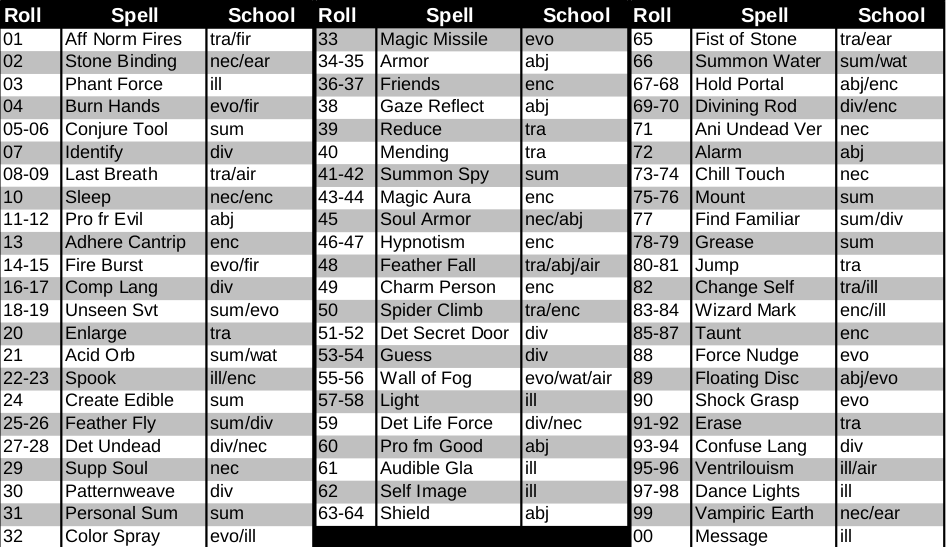
2nd Level Spell Generation
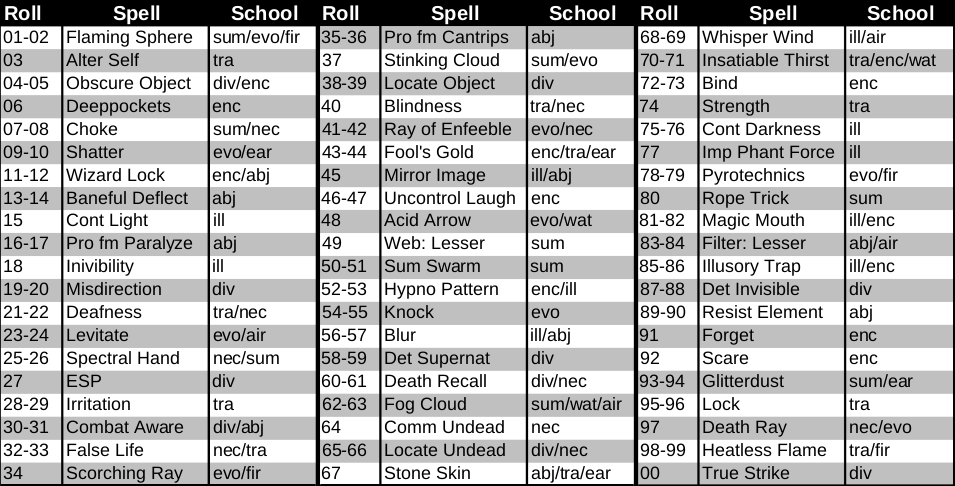
3rd Level Spell Generation
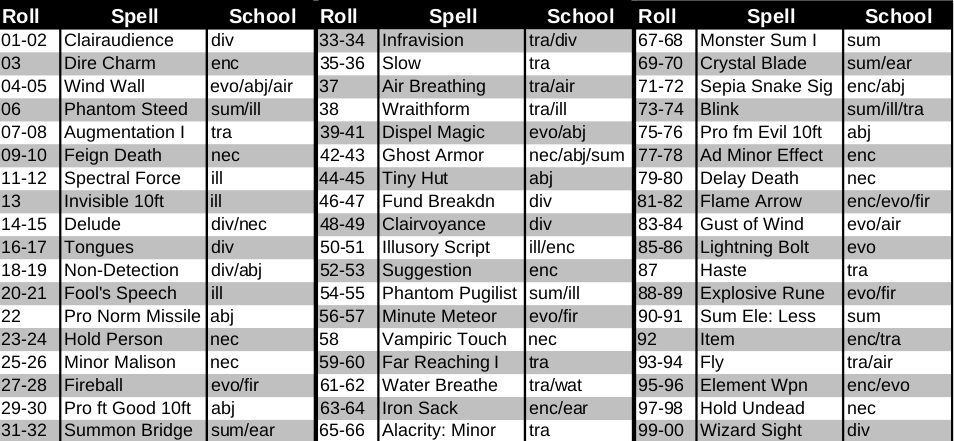
4th Level Spell Generation
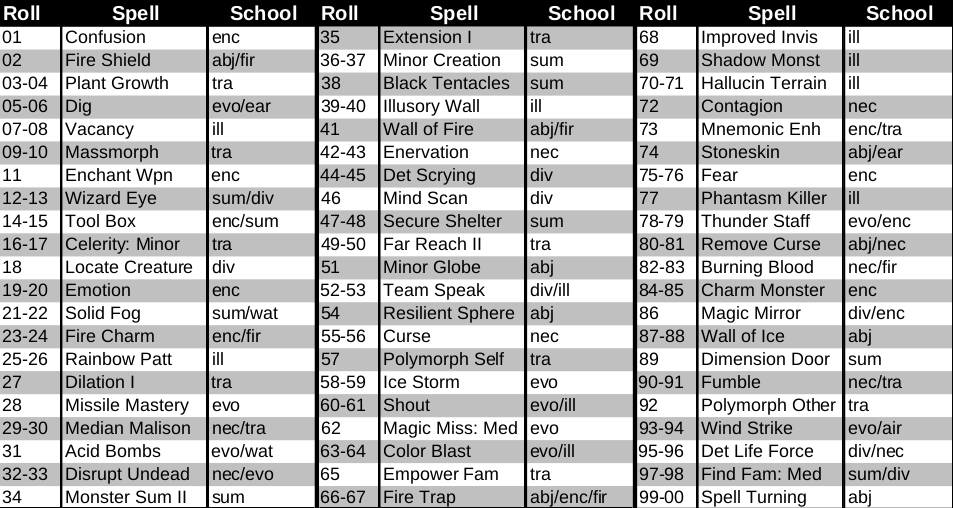
5th Level Spell Generation
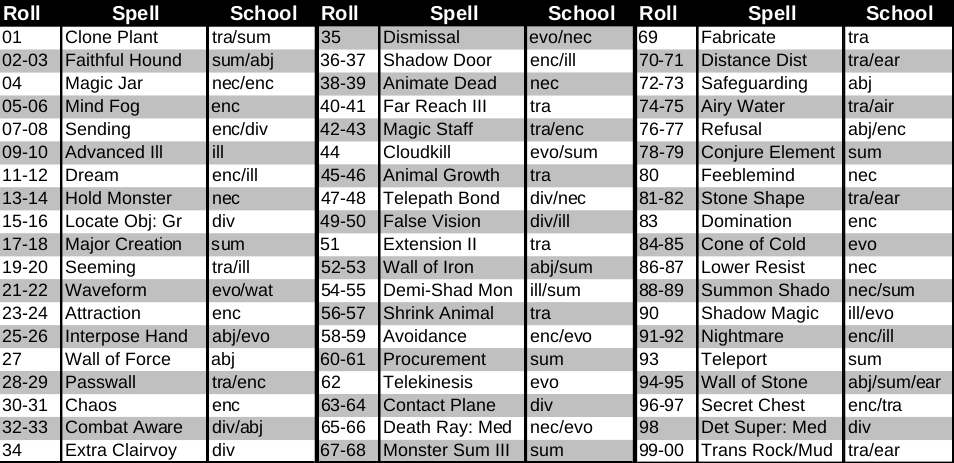
6th Level Spell Generation
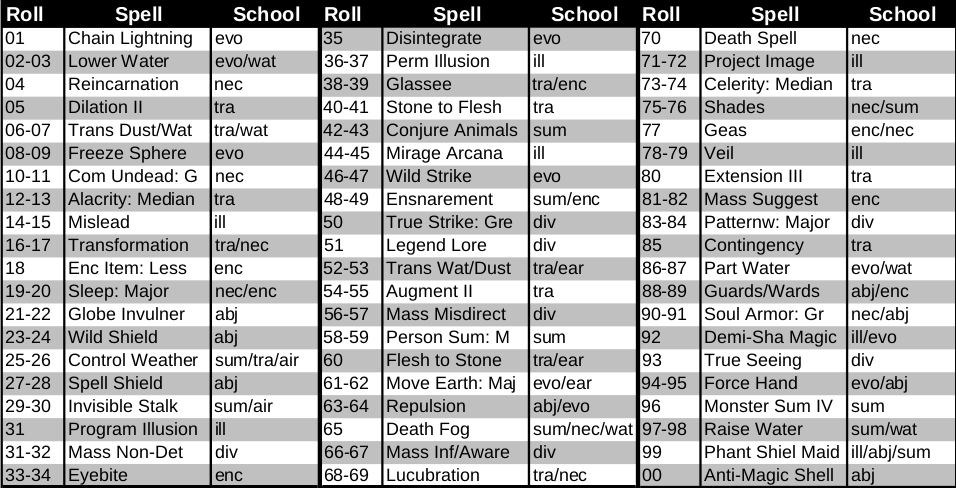
Unlearning Spells
Often as a wizard’s power grows, new, more powerful spells may duplicate effects and uses of a lower level spell in part or as a whole. Other times, the character’s concept or focus has changed as part of the game to game growth, plot and/or storylines and certain spells no longer make sense. In any case, unlearning spells should be approved by the DM and be accompanied by an adequate argument explaining the case for unlearning a spell or otherwise be recommended by the DM himself. Beyond this, use the following guidelines to aid in this aspect of spell repertoire management
- A wizard must have access to spells at least two levels higher than those he wishes to unlearn (i.e. – a 5th level mage gains access to 3rd level spells and may now think about unlearning some 1st level spells)
- A wizard may only unlearn a number of spells up to ¼ his maximum number of allowed spells per level (i.e. – a mage with 18 Reason [max 16 spells] may unlearn up to 4 spells per spell level)
Once spells are unlearned wizard may attempt to fill the empty spell slots with spells approved by the DM. In order to learn such a new spell, a wizard MUST roll his learn spell %. If he fails, he should not be allowed to learn that spell. Of course, specialists still remain blocked from oppositional spells completely. In general, new spells should be gained through one of the following ways
- Another PC or NPC wizard with the teaching skill may attempt to teach a known spell to the character in question. This requires a successful teaching skill roll (may be attempted once per game session) and the learning check
- With DM approval, a character can be stated to be researching a spell that is either an offshoot or parallel with their current specialty or something that the wizard has been experiencing a lot of in game. In this case, the DM will come up with an appropriate time line for the learning of the spell (usually a couple game sessions)
- A wizard may learn from some ancient scroll, document, etc. the formula for a new spell (often this is a way to gain completely unique spells uncovered from the ancient past.) Again, the DM will come up with an appropriate time line for learning such a spell based on it’s complexity and a successful learning check will need to be made with appropriate penalties applied